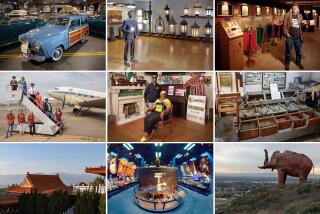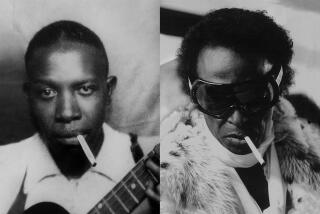Old treasures seek new owners
Wally G. Shidler is a connoisseur of Southern California ephemera. He owns thousands of schedules for the old Red Car transit system, old tour books and pamphlets, faded histories of Los Angeles-area cities.
The retired film engineer from Walnut Park was in his element Saturday, caught up in a sea of more than 1,000 other collectors and would-be collectors at the Huntington Library in San Marino as part of “Bazaar Fever,” the second annual Los Angeles Archives Bazaar.
Like many of the people who huddled around his exhibit table, he is undecided what to do with the eclectic assemblage, because he has no children and he wants it to live on when he is no longer able to show it.
“It really should go to a library, because if it’s private, nobody’s going to see it,” said Shidler, 68. But he worries that his collection is too varied for a single museum, he said, “and I really don’t want to break it up.”
Others echoed his concerns.
“When you get in your 60s, you start thinking about these things,” said Santa Monica photographer Irene Fertik, who has assembled photos from 42 years of work in vastly different settings -- New York City, Vermont, Los Angeles -- that would not fit neatly in a single archive or museum.
Poster collector Carol Wells and co-speaker Michael Palmer, archives project director at ONE National Gay & Lesbian Archives, had several suggestions for listeners Saturday. They advised that collectors write down how they want their collections to be used, create a one-page description, research other collections on the Internet and visit potential libraries or archives.
Those donating collections might consider contributing funding, because preserving and archiving material can be costly, said Wells, an art historian.
Wells and Palmer gave a seminar at the event titled, “You Can’t Take It With You: What to Do With Your Collection When Your Kids Don’t Want It.”
Wells’ advice: Plan ahead.
“People begin collecting things because they’re passionate about them. But children often reject a lot of their parents’ passions and their parents’ interests,” Wells said. “I certainly wouldn’t leave it up to the kids to make the decision.”
Wells began collecting political posters -- from Vietnam War protests, civil rights activism, campaigns against Los Angeles police brutality. She has preserved the collection, she said, by creating a nonprofit in 1989 known as the Center for the Study of Political Graphics. She then donated her 5,000 posters to the center, which develops traveling exhibitions.
“That wasn’t easy. Once I donated them, I couldn’t get them back,” Wells said. But many other donations followed, and the center has 60,000 posters.
Media archivist Lance Watsky offered advice on preserving home movies. He showed footage of the construction of Los Angeles City Hall in the 1920s, filmed by a local attorney and preserved by his descendants.
He suggested that families consider donating original material to an archive or museum and keeping copies. He recalled how Hurricane Katrina damaged what he called the most important photo collection of Biloxi, Miss. The collection was in private hands.
“Institutions had to come in after the fact to try to save the collection,” said Watsky, who is program coordinator for the UCLA Moving Image Archive Studies Program.
The Saturday bazaar was presented by LA as Subject, a research collective hosted by the USC Libraries. It featured exhibits from 41 local collections, including the Filipino American Library and the Autry National Center’s Museum of the American West.
Some said the crowds were evidence that Angelenos -- long thought to have little interest in local history -- are learning the value of preserving it.
Said Susan Anderson, managing director of LA as Subject: “One of the reasons this is important is that Los Angeles is probably one of the most under-researched places in the world.”
--
More to Read
The biggest entertainment stories
Get our big stories about Hollywood, film, television, music, arts, culture and more right in your inbox as soon as they publish.
You may occasionally receive promotional content from the Los Angeles Times.










